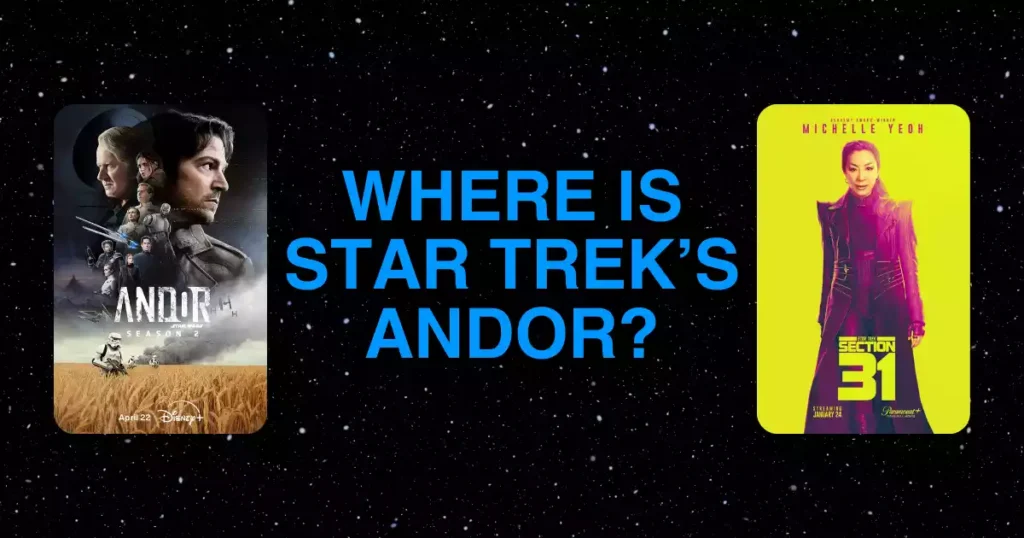
I’ve been a Star Trek fan for as long as I can remember. I’m the one who convinced our family to start watching Star Trek: The Next Generation when it premiered. When I was in high school, I wore a Starfleet uniform to school for Halloween. My Data cosplay even made it into our high school yearbook.
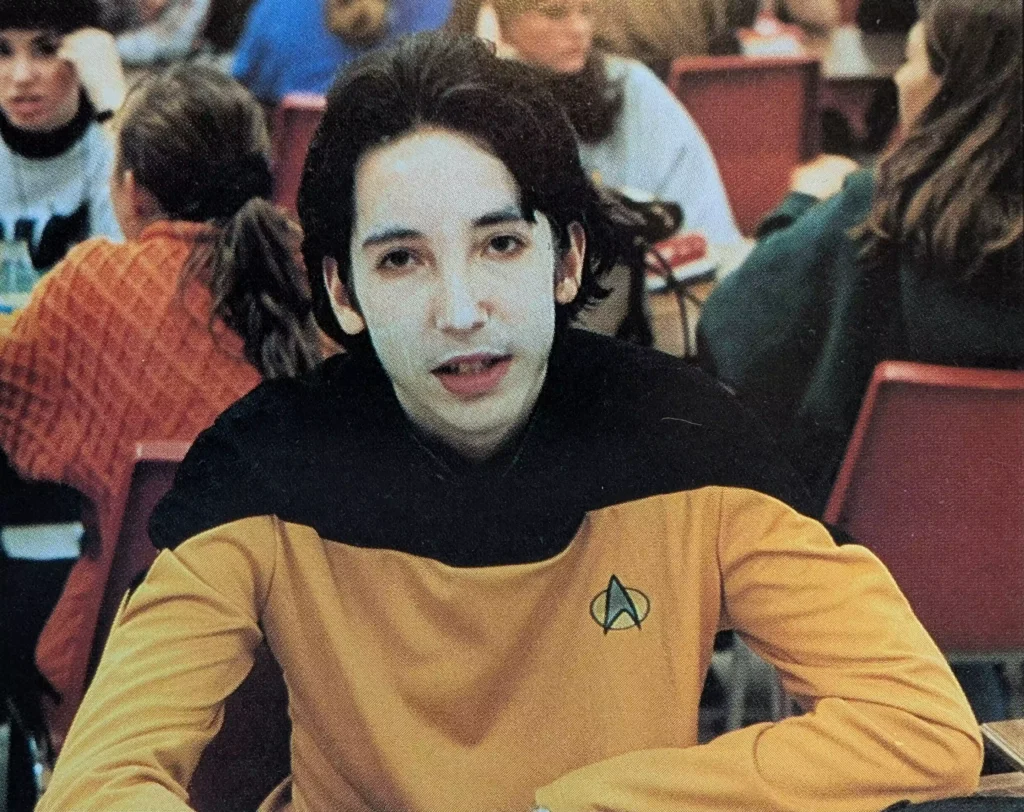
As an adult, I eventually got around to watching every official Star Trek episode, film, and short ever made.

I’m also a Star Wars fan. I’m not nearly as invested in the Star Wars franchise, but I would qualify as a Star Wars fan by most standards. I’ve seen the nine main movies plus Rogue One. I had a few of the earliest Star Wars toys back in the day. Every empty paper towel roll or wrapping paper roll I get my hands on becomes a lightsaber.
And I recently watched Andor. It took me a while to get around to it because it wasn’t Star Trek and I tend to prefer Star Trek. But I eventually heard so many good reviews that I decided to give it a try.
Andor as Antifascist Cinema
Andor is one of the most compelling TV shows I’ve ever watched. Yes, I’m more than willing to admit that as someone who has traditionally been more of a Star Trek nerd. The characters, the acting, the plot, the settings, the cinematography, and more all came together to create a complex and rewarding story that is both deeply moving and profoundly antifascist.
This isn’t just a Star Wars story. Yes, it’s a wonderful contribution to the Star Wars franchise. But it’s not by any means a show just for Star Wars nerds. Even viewers who normally reject science fiction or pop culture films may be drawn in by the excellent storytelling and antifascist themes.
If human society still exists in a century or two, Andor will be studied as an example of antifascist cinema produced and released in a time when fascism was on the rise in the real world. It’s already receiving some recognition along those lines from critics and scholars. That recognition will only continue with the passage of time and the benefit of historical perspective.
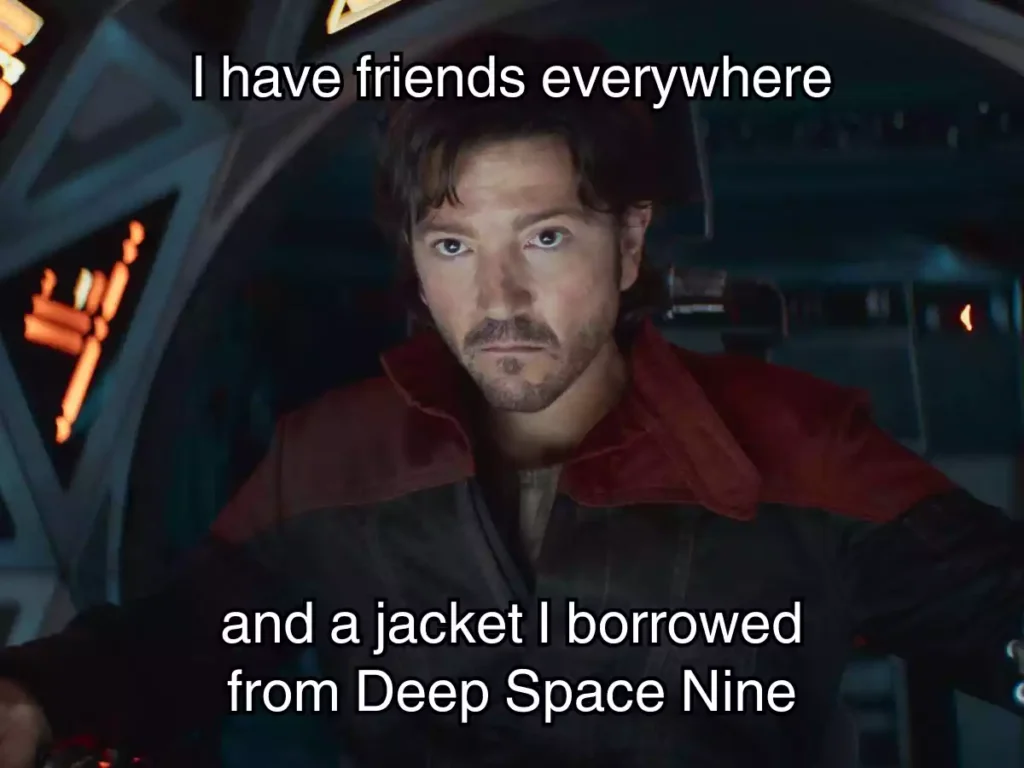
As a viewer watching Andor while living under the Trump regime, I often found myself overwhelmed by a deep emotional response to what I was watching. The details of the story were different enough from real life that I could stay focused on the fictional Empire and emerging Rebel Alliance while I was watching the show. But as soon as I was done watching each episode, the real-world thoughts and emotions came rushing in.
What does resistance to fascism look like in real life? What can any of us who are sitting around watching Andor actually do in real life to support antifascist organizing? How do we balance the need to survive while surrounded by a hostile empire with the need to do something to resist that empire in meaningful and effective ways?
I’m not going to try to answer any of those questions here. There are plenty of people in academic circles and community organizing circles who are answering those questions far better than I can in a single post. My point here is that Andor is a deeply thought-provoking and inspiring work of antifascist cinema. It encourages the viewer to empathize with people who are living under a repressive regime and finding ways to rebel against that regime. It also encourages viewers to reflect on the complex and often grim ethical choices that arise in such a dire situation.
Star Trek as Utopian Cinema
As a Star Trek fan watching Andor, I couldn’t help but ask myself a simple question. Where is Star Trek’s Andor? What stories is Star Trek telling about fascism and antifascism at a point in real-life history when fascism is on the rise in the U.S. and globally?
Before answering that, let’s take a moment to review Star Trek’s long history as a purveyor of utopian cinema. This history will help us to understand why Star Trek hasn’t told a story quite like Andor yet and what prospects there are for antifascist storytelling within the Star Trek franchise.
The utopian vision and strong sense of social justice running through decades of Star Trek shows and films is arguably the main draw of the franchise. Many other people have told stories involving aliens, hypertech space travel, and so on. But Star Trek stories have time and again kept returning to the utopian themes of the series.
Star Trek embraces a broad utopian vision that differs sharply from the rebellion-centric narrative of Star Wars. It tells the story of a society that exemplifies some of the greatest potentials of the human species and its alien allies. A story in which the main characters are living in a utopian United Federation of Planets rather than living in a dystopian Galactic Empire.
The exact nature of this vision has evolved over time. But each incarnation of Star Trek arguably continues to answer the same broad questions about the nature of a good society. What would it be like to live in a society where people all live and work together as equals, sharing their resources and using them for the good of all, peacefully exploring the galaxy in the name of scientific and cultural discovery?
Some fans have connected this recurring Star Trek utopianism to the broader idea of “fully automated luxury gay space communism.”
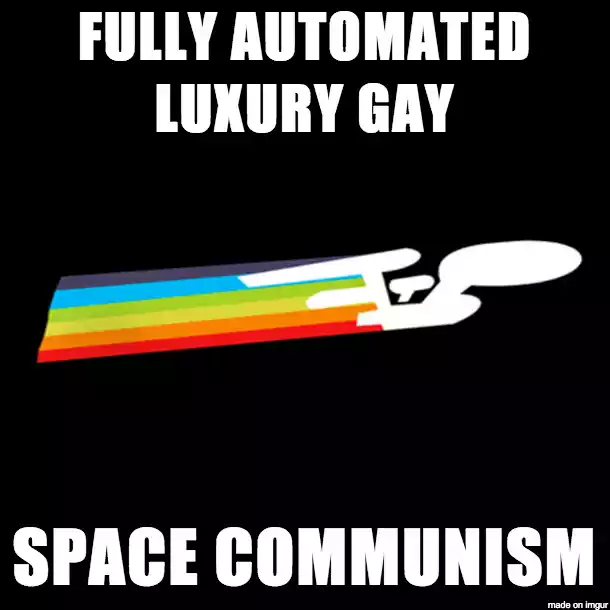
Whether you like that particular term or not, it speaks well to the vision of the franchise. Star Trek is presenting a utopian perspective on what it means to be human and what humanity is capable of becoming if we choose to embrace laudable core values similar to those espoused by the United Federation of Planets and Starfleet.
Star Trek as Social Commentary
This is not to say that Star Trek is entirely or even primarily about what life is like in a utopian society. The utopian vision is usually there in some form, but it’s not always the main focus of the story. We don’t often see stories about people having a lovely day on a Federation planet, enjoying the tremendous benefits of living in a society where everyone’s basic needs are met and they’re all free to do whatever they’d like with their lives.
There’s a good reason for this. Most people would probably find it boring if Starfleet explored the entire galaxy and didn’t come across any conflict. Utopian stories where everything’s going well are rare for a reason. They tend to be boring.
Instead, some of the best Star Trek stories lie at the intersection between utopian ideals and dystopian (or at least unpleasant) realities.
How do these peace-loving explorers respond when attacked or threatened by outsiders? When and how do they intervene when they see what they consider to be an injustice? What do they do when there’s internal disagreement about important ethical questions?
Like many great sci-fi stories, Star Trek often explores real-world social issues and ethical questions in the context of a sci-fi setting. This fictional context makes it easier to address controversial and emotionally-charged topics because the characters and setting are a step or two removed from the viewer’s everyday reality.
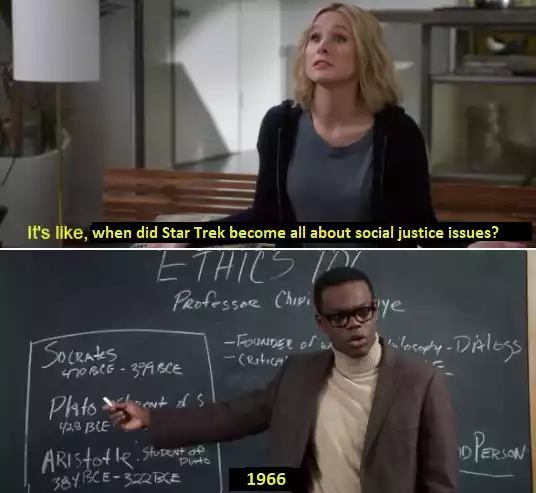
For example, the original series featured a bridge crew that was far more diverse than just about any governmental or corporate leadership team in the U.S. in the 1960s. To my knowledge, no other show of the era had anything quite like it. The networks were almost exclusively run by white men who wouldn’t have allowed such diversity out of some combination of their own biases and their fears of the audience’s reaction. But because the Enterprise was a futuristic sci-fi spaceship rather than a more realistic ship, they got away with having a more diverse crew.
And then there are the individual episodes and multi-episode plot arcs.
In “Let That Be Your Last Battlefield,” an alien species that is half-black and half-white becomes a plot device for exploring the absurdity of racial prejudice and the devastating consequences for the world when racist and genocidal sentiment is taken to its natural conclusion. “Patterns of Force” featured a storyline about fighting fascism in the form of an entire planet that had adopted the ideas of Nazis due to the ill-conceived meddling of human visitors. “Rejoined” featured a same-sex kiss and romantic relationship a year and a half before the groundbreaking Ellen coming out episode, “The Puppy Episode.”
Some of these stories even use time travel to directly address real-life questions of ethics and justice in the past or present. “The City on the Edge of Forever ” in the original series reflects on the conflict between seeking peace versus fighting fascism, and the personal sacrifices that people sometimes make for the greater good, especially in the face of major existential threats like fascism. “Past Tense” in Deep Space Nine portrays a near-future Earth where the economic and political austerity policies of the present day have inevitably led to tremendous poverty, inequality, and oppression in the near future, ultimately sparking a historically important rebellion.
Deep Space Nine features some of my favorite examples of these social and political commentary episodes. The entire Dominion War plot arc in DS9 – especially “In The Pale Moonlight” and “It’s Only a Paper Moon” – deals with the grim realities of war in a deep and sustained way. And the recurring plot point of Cardassia’s occupation of Bajor, and Bajor’s rebellion against the occupation, is arguably the most explicit and thorough critique of colonialism anywhere in Star Trek, or most other pop sci-fi for that matter.
I could write all day about these examples. Some of these moral quandaries explored in Star Trek are handled better than others. But Star Trek has a rich decades-long history of at least trying to address relevant real-life social issues that may be (or should be?) on the minds of viewers.
Social Commentary in New Trek
So… what is Star Trek saying right now about the social issues of today?
One of the few areas where Star Trek has actually shown improvement over the years is in its overt representation of the LGBTQ community. This improvement comes at a vitally important time in history. U.S. society and much of the world in general is descending into the violent madness of anti-LGBTQ rhetoric and policy, with trans people in particular facing a tremendous escalation in governmental and societal oppression. Any favorable representation for trans and nonbinary characters at this point in history is a powerful statement.
Beyond that? I’m not impressed.
One of the most disappointing and honestly disheartening recent additions to the Star Trek franchise was the film Section 31.
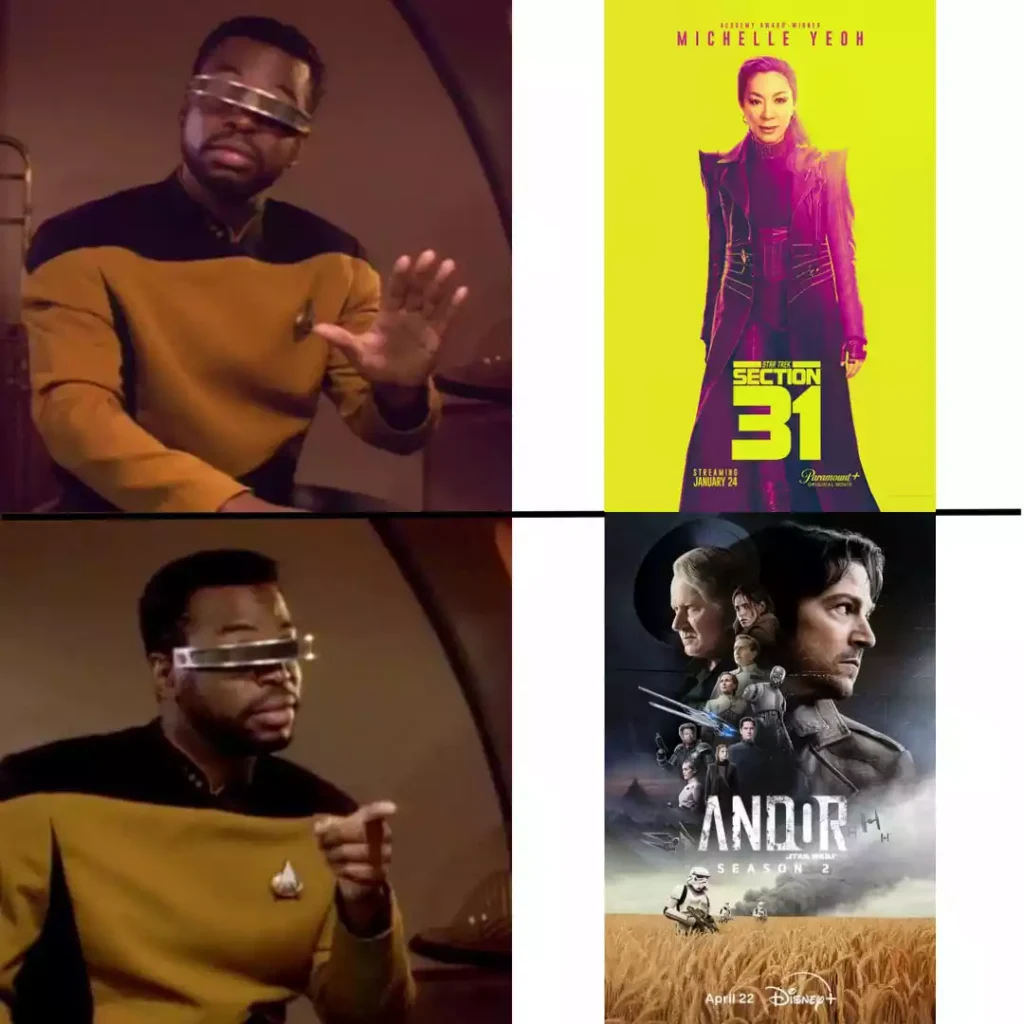
It’s an entertaining movie if you can see it as a mindless action flick with a few exciting twists and turns. It also fleshes out a bit of Star Trek lore, which is both a good thing and a bad thing depending on how much you like the film.
But seriously? This is the moment in history when the people who currently run the franchise chose to release a film featuring a semi-reformed genocidal maniac main character and a largely positive portrayal of the most dystopian faction within Starfleet?
Don’t get me wrong. Michelle Yeoh is amazing and could make just about anything she stars in worth watching. And many other people involved did their best with the hand they were dealt. I’m not going to reject it as a “Real Star Trek” film simply because I didn’t like it and it blatantly clashes with the overall utopian themes of the franchise.
However, the end result is a film that does more to justify and redeem fascism than to challenge or critique it. And while the rest of “New Trek” has been highly enjoyable and often compelling, it has done surprisingly little to speak to the great concerns and controversies of our time in anything remotely approaching the way that older Star Trek shows and films aspired (and sometimes failed) to do.
My Take on Star Trek’s Andor
So there you have it, folks. Star Trek is in desperate need of a return to the recurring utopian vision and social critique that has made it so compelling over the years. It’s time for the franchise to address the rise of fascism in the real world and to speak in meaningful ways about any number of social and political issues that are on the minds of Star Trek viewers.
But what do we do about it?
As viewers, there’s not much we can do about it aside from letting the people involved in the franchise today know what we want and keep our fingers crossed that they’ll listen.
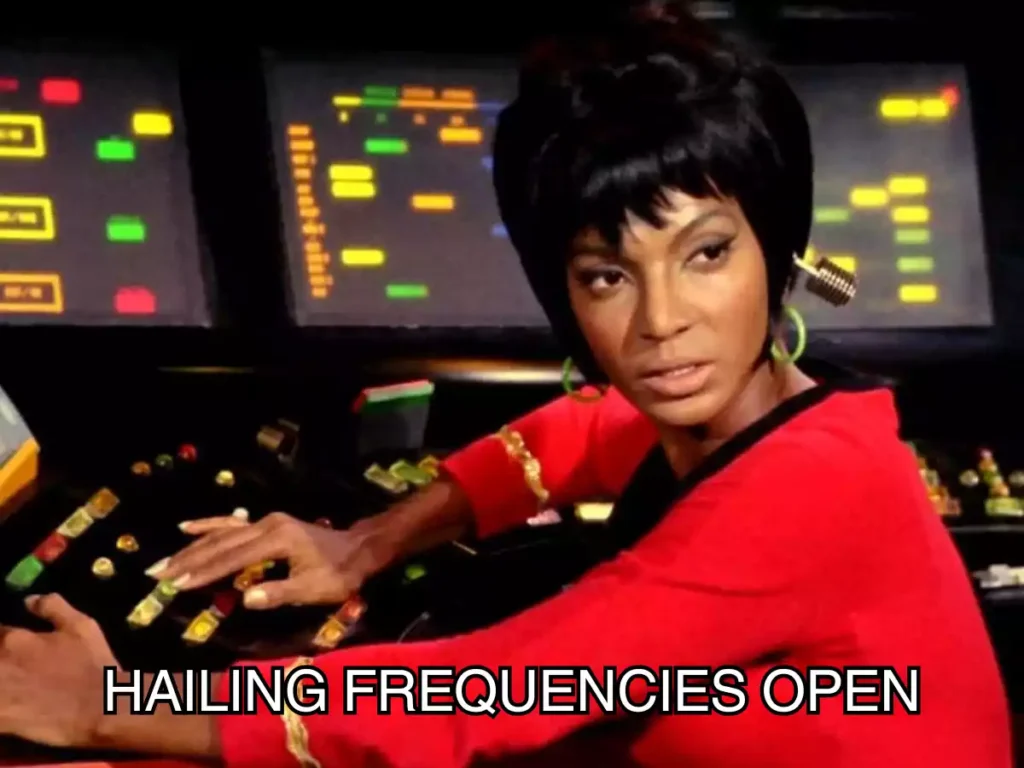
In the meantime, I do have ideas. Here are a few fun story concepts that I’m happy to share with fellow fans. If anyone involved with Star Trek actually wants to use these ideas, let me know. And if any fans want to use these as the basis for writing fan fiction, you’re welcome to do so – as long as you give me credit for the original idea. And a cut of any commercial opportunities that may arise. My main focus as an author is climate fiction and climate book reviews, but I’d be happy to branch out for the right opportunity.
Star Trek: Phoenix
What was World War III like in Star Trek canon? How did humanity go from nearly wiping itself out to traveling the stars as a unified species with a relatively utopian global society?
Past storylines have touched on this but not explored it fully. There are practical reasons for this gap in Star Trek lore. Any story set too close to the present day runs the risk of coming into conflict with real-world history. The Star Trek timeline has already undergone some vague and somewhat unsatisfying updates because of this.
But it seems like such an opportunity to explore the story of people coming together to create a more utopian society in the ashes of a more dystopian one. This is a difficult type of story to tell any later in the timeline because the Federation would already exist as a utopian society. Show us a story of humanity pulling together in the face of adversity to build a society that serves as an inspiration and foundation for the entire Federation.
The Post-Enterprise Years
What happened between the end of Star Trek: Enterprise and the start of Star Trek: Discovery?
I’m not the first person to ask this question. Many other fans have seen the potential for some great storytelling here. But I also see the potential for some storytelling that explores the early days of the Federation and how to build a utopian society in the face of violent conflict and internal discord.
Resisting Cardassian Fascism
Cardassian society has largely been portrayed as inherently authoritarian. This was explored in depth in DS9 and elsewhere. It’s an established part of Star Trek lore.
I have not one, but two ideas related to this.
First of all, what did the Bajoran resistance against Cardassian occupation look like? DS9 has already explored this topic in some depth. But I could see a film or an entire series devoted to this as an easy way to use an established part of Star Trek canon to explore resistance to fascism.
Alternately, what would it look like if some Cardassians rebelled against the fascism of their own society? What if the aftermath of the Dominion War led to a fundamental shift in Cardassian society and the rise of militant antifascist rebellion? A film or series where most or all of the characters are Cardassian might be a hard sell, but I see potential here.
Star Trek: Maquis
I’m skeptical of this idea, but I’m going to share it anyway. And I see this as a different idea than “Resisting Cardassian Fascism” because the main characters would be ex-Federation members rather than Cardassians or Bajorans, and the Federation would be among the antagonists.
A show or film about the Maquis would be a bold and controversial choice for Star Trek’s exploration of themes of fascism and antifascism. It would be the first show or film where the main characters see the Federation largely as antagonists, though the Cardassians would likely be the main antagonists.
It might start with the origins of the Maquis and highlight some of the missteps and injustices that lead the Maquis to fight both the Cardassians and the Federation. If we’re sticking with the heavy U.S. political influence, maybe the Cardassians would end up being analogous to fascist Republicans. Can you picture Gul Dukat wearing a “Make Cardassia Great Again” hat? And the Federation would be analogous to appeasing “centrist” Democrats who abandon some of their constituents in an effort to protect the rest of the Federation.
Maybe there’s potential in this idea after all. I like the fact that it plays with existing story elements and teases out critiques of the Federation. But I don’t like the messiness of it. It seems too complex and detailed for a film plot and too anti-Federation for a show with a target audience of Star Trek fans. And the thought of equating the Federation with a neoliberal American political party, even as a thought experiment or loose analogy, leaves me feeling a bit queasy.
Why? Because on the one hand, I do like it when the writers problematize the Federation and Starfleet in particular. Most if not all good utopian stories either show how the utopia is in fact a dystopia after all or find ways to contrast the utopia with the dystopian aspect of today’s society. DS9 did an excellent job on both of those fronts and the other shows had their moments too. Even a society that is vastly better than our own will still have its problems. And these problems can serve as useful analogies for real-world problems.
But at the end of the day, I do feel like the main point of Star Trek is to portray a vision of a society that is far more just, compassionate, cooperative, post-scarcity, and so on than our current society. I see the most potential in stories where the Federation and Starfleet are the utopian vision that stands in contrast to dystopian realities. Not stories where the Federation is the Big Bad who must be stopped. This is why I would like to see either a story where humanity finds its way into that Federation mindset or a story where people who have that Federation mindset are resisting fascism from without or within.
Insert Your Ideas Here
What are your ideas for a Star Trek storyline that offers a response to the real-world rise of fascism? Let me know if you have any ideas along these lines that you think would work well as either fanfiction or an official Star Trek episode, series, or film.
I’m also interested in any Star Trek ideas related to the climate crisis or other real-world crises and issues that are relevant today. For example, I would be absolutely delighted to watch/write/advise on an episode where the main plot involves a planet that is undergoing something analogous to the climate crisis. I bet Good Energy would also be willing to consult on such an episode.
I don’t have any particular plans for these ideas or stories. I mostly write climate fiction and climate book reviews, not Star Trek content. But if my readers send in any good ideas, I’ll definitely share them in a follow-up post.
If we keep talking about this, maybe the people who currently run the franchise will realize how much appetite there is for this type of storytelling among Star Trek fans. In the meantime, the opportunity to talk with other Star Trek fans about political and ethical ideas is yet another part of what makes Star Trek so great.
My name is Treesong. I’m a parent, author, talk radio host, and Real Life Superhero. Follow me on Facebook, Bluesky, Instagram, and Ko-fi for my latest climate fiction releases and superhero adventures. Sign up for my newsletter to receive free climate fiction in your inbox. Check out my bookshop for climate change books, including reading lists for climate fiction, climate nonfiction, and climate poetry!